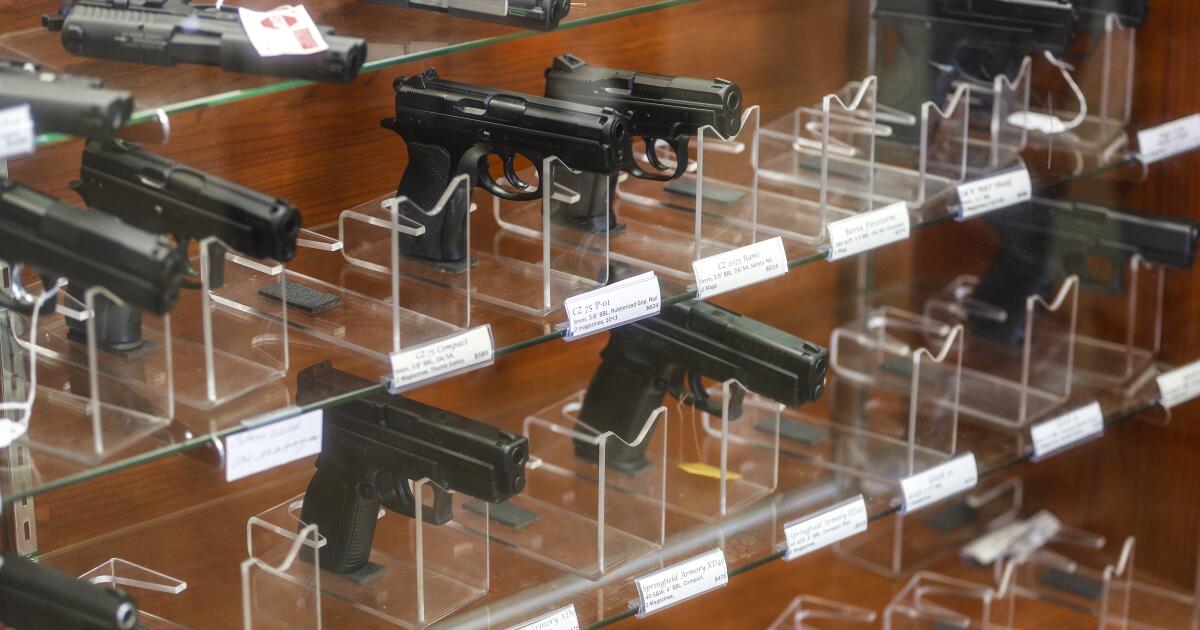

In what is becoming a familiar pattern, a San Diego federal judge ruled Monday that a California gun law is unconstitutional because of the lack of any historically similar laws.
The latest regulation to be overturned — though it will remain in effect for the time being, pending appeal — is the state’s ban on high-frequency firearms purchases, otherwise known as the one-gun-a-month law. It restricted California residents from buying more than one firearm within a 30-day period.
State lawmakers said the regulation was aimed at deterring straw purchases, which is when someone buys a gun on behalf of someone else who cannot legally make the same purchase. A group of firearms owners, licensed gun dealers and firearms-rights organizations sued the state, arguing the prohibition infringed on their Second Amendment rights.
U.S. District Judge William Hayes sided with the plaintiffs in a 24-page ruling granting a motion for summary judgment.
“Defendants have not met their burden of producing a ‘well-established and representative historical analogue’ to the (one-gun-a-month) law,” Hayes wrote.
That lack of a historical equivalent was the key to the case and has been the key to Second Amendment cases since June 2022, when the U.S. Supreme Court issued its decision in New York State Rifle & Pistol Association v. Bruen. That decision changed the analysis for Second Amendment regulations, introducing a “text, history and tradition” standard that places nearly singular importance on laws that date back to the time period around when the Second Amendment was ratified.
Courts considering whether modern gun regulations are legal must make their decisions based on the “Second Amendment’s plain text” and must ensure new laws are “consistent with the nation’s historical tradition of firearm regulation,” according to the Bruen decision.
Under that analysis, federal judges in San Diego alone have over the past year overturned California laws banning assault rifles, outlawing billy clubs, imposing background checks for ammunition purchases and banning certain “unsafe” handguns. All of those rulings are under appeal with the 9th U.S. Circuit Court of Appeals.
“Another week, another California gun control law declared unconstitutional by a federal court,” Cody Wisniewski, an attorney for the Firearms Policy Coalition, one of the plaintiffs in the case, said in a statement.
“California’s one-gun-a-month law directly violates California residents’ right to acquire arms and has no basis in history,” said Wisniewski, who is also vice president and general counsel for Firearm Policy Coalition’s Action Foundation. “Given it seems certain California will refuse to learn its lesson, we look forward to continuing to strike down its gun control regime and to defending this victory.”
A spokesperson for California Attorney General Rob Bonta, the defendant in the case, said Bonta’s office is still evaluating the decision, but reiterated that pending appeal, “the law limiting firearm purchases to one every thirty days remains in effect at this time.”
In his ruling, Hayes noted that the Supreme Court’s Bruen decision has left the door open for a “more nuanced approach” to the analysis of a weapons law when it’s dealing with “unprecedented societal concerns or dramatic technological changes” that were not present when the Second Amendment or the 14th Amendment and its equal protection clause were ratified.
The government had argued that more nuanced approach was warranted in this case because gun trafficking and straw purchases were problems that “did not exist during the Founding or Reconstruction eras to the same extent that they exist today,” and that lawmakers of those eras did not have to confront the “dangers associated with bulk purchases.” Hayes agreed to analyze the case under the assumption that it qualified for the more nuanced approach.
But even so, the judge ruled that the government failed to identify any historically similar laws, or at least enough of them. He wrote that the closest analogue the government presented was a colonial-era law that banned the carrying of more than one gun when traveling near a Native American town or a certain distance away from an English plantation.
Hayes did not say whether that law would have been similar enough to uphold California’s one-gun-a-month ban. But he noted, citing previous rulings, that “even assuming the law is sufficiently analogous to the (one-gun-a-month) law, ‘one solitary statute is not enough to demonstrate a tradition of an arms regulation.’”
Hayes wrote that he would issue a 30-day stay of his ruling to facilitate an appeal to the 9th Circuit.







